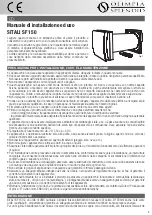
1.2
OPERATION OVERVIEW
The CMM/CLM heating system is intended to maintain an engine’s optimal starting temperature while the engine is shut
down. The heating system may be activated locally or by optional remote control (
see
SECTION 2.4.2
). The CMM/CLM
heating system should be deactivated upon engine start-up.
During heating system operation, a centrifugal pump takes coolant from the drain area low on the engine water jacket
and forces it through the heating tank and into the coolant return line. The coolant pump will continuously circulate fluid
throughout the engine. To maintain consistent fluid temperature, the heating elements will cycle on and off at the user-
selected temperature control point.
A coolant check valve (included with the CMM/CLM unit and installed at the coolant outlet) prevents backflow while the
engine is operating. When the engine is shut down, the heating system should be activated locally or remotely to resume
maintaining the engine’s optimal starting temperature.
COOLANT
RETURN
COOLANT
SUPPLY
Figure 2. CMM/CLM
system operation.
Component illustrations
are for reference only and
are not to scale. See part
drawings for dimensions
and specifications.
COOLANT
PRESSURE
RELIEF
Summary of Contents for CLM
Page 2: ......
Page 6: ...iv installation operation manual cmm clm heating system ...








































